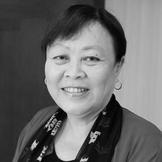Professor Ping-chen Hsiung

The Chinese University of Hong Kong
Professor Hsiung Ping-chen is currently the Director at the Research Institute for the Humanities at The Chinese University of Hong Kong. She served as Dean of the Faculty of Arts at The Chinese University of Hong Kong from 2009 to 2011, and Dean of the College of Liberal Arts at Central University from 2004 to 2007. Also, Prof Hsiung has been serving as the Research Fellow at the Institute of Modern History, Academia Sinica, Taipei since 1990, and K.T. Li Chair at Central University in Taiwan since 2006. An internationally renowned scholar in her field, she has also made remarkable achievements in academic administration.
Having received her B.A. in History from Taiwan University, she furthered her studies in the US and received her M.A. and Ph.D. in History from Brown University and her S.M. in Population Studies and International Health from the School of Public Health at Harvard University. Her research interest lies in the areas of women’s and children’s health, gender and family relations, and intellectual and social history of early modern/modern China and Europe. She served as Director of the Humanities Centre at the Central University in Taiwan, and played an instrumental role in founding the interdisciplinary group ‘Ming-Ch’ing Studies’ at the Academia Sinica. Over the years, Professor Hsiung has held visiting professorships at many leading academic institutions in North America, Europe and the Asia-Pacific region, including UCLA, Cornell University, University of Michigan, Freie Universitat Berlin, and Keio University, Japan.
Food and Aging in Late Imperial China: Material Provision and Textual Evidence in Comparison
We are what we eat, many cultures across time and space recognize this.
This is a study that begins with the cultural and historical definitions of food vs non-food in the Chinese (Sinic) linguistic world, then moves on to explain its religious and social connotations in the everyday life, especially as it pertains to the pursuit of longevity and aging in the late imperial period with contemporary implications.
The textual evidence that we'll examine is the "Advice for Aging" by Tsao Ting- Tung, and the food item we'll focus on is the 100 kinds of congees listed.
Comparative reflections on material culture, health, medical humanities, and historical demography will be drawn with the discussions thus generated.
